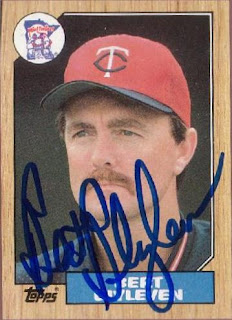 1991 Pacific Nolan Ryan # 40 - pitchers hitting
1991 Pacific Nolan Ryan # 40 - pitchers hitting
 2005 Topps Cracker Jack Roger Clemens #70 - pitchers hitting
2005 Topps Cracker Jack Roger Clemens #70 - pitchers hitting
 2003 Fleer Patchworks Jeff Bagwell #74 - bonus baby / cameo by Barry Bonds
2003 Fleer Patchworks Jeff Bagwell #74 - bonus baby / cameo by Barry Bonds
By the end of 2009, I hope to have picked up 500 new collecting topics cards featuring various characteristics - I'm looking for cards with personality because there is nothing like finding a 'fun card' with a unique image or characteristic that is not going to cost much more than a nickel or a dime.
A.) Bonus babies – cards featuring star players who make cameos on mostly common players' cards.
B.) Inking it up – cards featuring players signing autographs.
C.) Unique shots/awesome action – baseball, basketball, football, hockey. Can be posed.
D.) Awesome outfield action – cards featuring players leaping, diving, jumping to grab the ball. Can be posed.
E.) Tools of ignorance – cards featuring catchers, maybe the hardest working players on the field.
F.) Facial hair – cards featuring players who are wearing beards, goatees, porn-mustaches, et al.
G.) High-toppers – cards featuring players players sporting high-top socks.
H.) Grips – cards capturing pitchers' grips during their delivery.
I.) Unique backs – cards detailing something a fun fact or a feat.
J.) Two-sport stars – cards of professional athletes who've been known to have played in other sports.
K.) Cult baseball players/unique feats – cards of baseball players who were considered quirky, a good quote, a little kooky, looney, attracted a unique fanbase, some notoriety or have actually done something unique on the field.
L.) Hats-off – cards featuring players without their hats on.
M.) Players smiling – cards featuring players smiling or hamming it up for the camera.
N.) Pitchers hitting – cards featuring pitchers hitting, running the bases or wearing batting helmets, about to step up to the plate.
O.) Retro uniforms – cards featuring players wearing turn back the clock jerseys/uniforms.
P.) Broken bat shots – cards featuring hitters breaking their bats.
Q.) Beyond the glory – cards featuring players who have battled addictions, battled career threatening injuries, mental problems, et al.
R.) Uncorrected errors – virtually worthless, but still unique to have a card with a name mispelled or a card with the wrong player pictured, et al.
S.) Steroid Era / PEDS – cards of players who were busted, suspected, reported, outed, et al.
Collecting topics that can go on forever –
A.) Bloodlines [actual and loosely related] – cards featuring players who are related to another player as a cousin, father-son, stepson, wife, odd bloodlines [a player is related to someone in another sport or non-sport endeavor], et al.
B.) Local players [Orange County, California] – cards featuring players local to the county, high school or college.
C.) Nations – sorted by country
D.) Infamous – all sorts of professional athletes who have been known [or not known] to have done something notable in their careers.






























